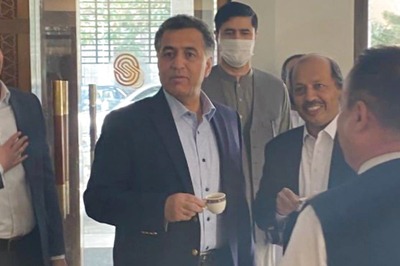
views
Mumbai: Close to 1,500 aggrieved residents of Gandhi Nagar in Mumbai’s Worli area have decided to boycott next week’s assembly elections after allegedly being left to fend for themselves since their slum colony was demolished in 2012. Aaditya Thackeray, son of Shiv Sena chief Uddhav Thackeray, will make his electoral debut from this constituency in the October 21 Maharashtra polls. However, many residents here say they will not vote unless they get an assurance about their rehabilitation project. According to locals, their slum colony consisting of more than 1,000 homes was torn down in 2012 to make way for a 23-storey Slum Rehabilitation Authority (SRA) building. But the developers stopped construction midway around two years ago due to lack of funds.
“After our homes were demolished, we were given Rs 15,000 for monthly rent till 2016, but they have stopped paying us for the past three years,” said Lakshman Golani, a Gandhi Nagar resident . “The building is not fully constructed and we don’t know where to go, where to live. We don’t have rent money nor a house.”
Another resident, Vasudev Kokil, added that they have approached many corporators and MLAs from various parties, but they have not received any aid or assurance. “We knocked on every door possible. This building changed hands of three builders and none of them have been able to complete the project. Initially it was supposed to be 18-storey. Then they told us it would be 23. Now they are planning to increase the height even further. We don’t even know if they have permission to do that. But we have been suffering because of all this,” he said.
Locals requested authorities that the families be shifted to transit camps as they had stopped receiving rent money, but they were left to fend for themselves, said Narayan Irkula, also a resident of the area. “We did not get an alternate accommodation despite begging for it. After they stopped giving the rent, we don’t have a proper roof over our heads,” he said. “We live with friends or relatives in a cramped space or pay extra for a room which we cannot afford as most of us do low-paying labour for a living. Where will we go?”
Not a one-off
This, however, is not an isolated issue of housing and redevelopment in Worli. The expensive skyscrapers and high-rises that dot the coast of this “posh” neighbourhood stand over a sea of dingy slums and crumbling Bombay Development Directorate (BDD) chawls that are crying for attention.
Ram Charan, a 50-year-old resident of a slum colony in Worli, said, “There are 4,500 hutments in my area Jeejamata Nagar alone. And there are a dozen more such localities. I have been hearing since childhood that it will develop. We don’t have proper bathrooms or urinals. The homes are crammed and stuffy where more than six people live under one roof.”
With more than 25,000 units, Worli is home to a large number of slums apart from about 10,000 BDD chawl units. Some of these have been redeveloped over the years, some have their development work stuck, and many are still awaiting nod for refurbishment even as the landscape of Worli is bourgeoning with expensive residential towers. The BDD chawls were built by the British and were meant to be prisons, but were later used for accommodation. After the British left, the chawls came under the jurisdiction of the state government and were handed over to the public works department (PWD) for maintenance. Many migrants and mill workers started living in these old, dilapidated buildings mostly located in Worli and nearby Lower Parel.
Sushil Varma, resident of a BDD Chawl, said, “We heard that they will expand the size of the house to 500 square feet. These are 100-year-old buildings that require a lot of repairs and redevelopment. The rundown structures can fall anytime. A lot of surveys have been done and some of the chawls got redeveloped and many were shifted to better apartments. But others are still awaiting progress.”
Panvel’s problems
On the outskirts of Mumbai, around 30 housing societies in Panvel have also started a campaign to boycott the polls over lack of development. Banners displayed outside these apartment complexes have messages like, “No Road, No Development, No Vote” and “No Water, No Vote”. According to locals, there are approximately 45,000 voters here.
Residents say they have been urging authorities to address their problems, but after receiving no help, they have decided to boycott the elections to make themselves heard.
Chandrashekhar Avate, a resident of Hex Blox complex at sector 10 in Kharghar, said, “The major issues here are roads and water. We have complained several times, but the roads are not maintained. If this is the condition then why should we vote?”
Many roads in Kharghar are in a broken-down state, which has prompted this campaign.
“You can see the situation of the roads. Every year they just paper over them and again during the rainy season the situation becomes the same. So there is no point in voting for such administrators who do not care about the people,” said Preeti Raghu, a resident of Rosewood Heights at Kharghar.
According to Meena Shah, a resident of Arihant Sharan at Roadpali in Navi Mumbai, locals have been dealing with a water crisis for four years, and complaints to authorities have gone unnoticed. “I have been living here for five years. We got water supply only the first year, but there has been a crisis since then. We get tanker water, but do not know where they get that from. It is dirty and people fall sick.”
Deepak Singh, an activist, said he has been requesting people to vote NOTA (‘none of the above’). “Our motive behind this campaign is to get 1 lakh votes for NOTA, so that it will send a message that if you do not work, people will not vote for you,” he said.
Prime Minister Narendra Modi is slated to address a rally in the Panvel assembly constituency on Wednesday.




















Comments
0 comment